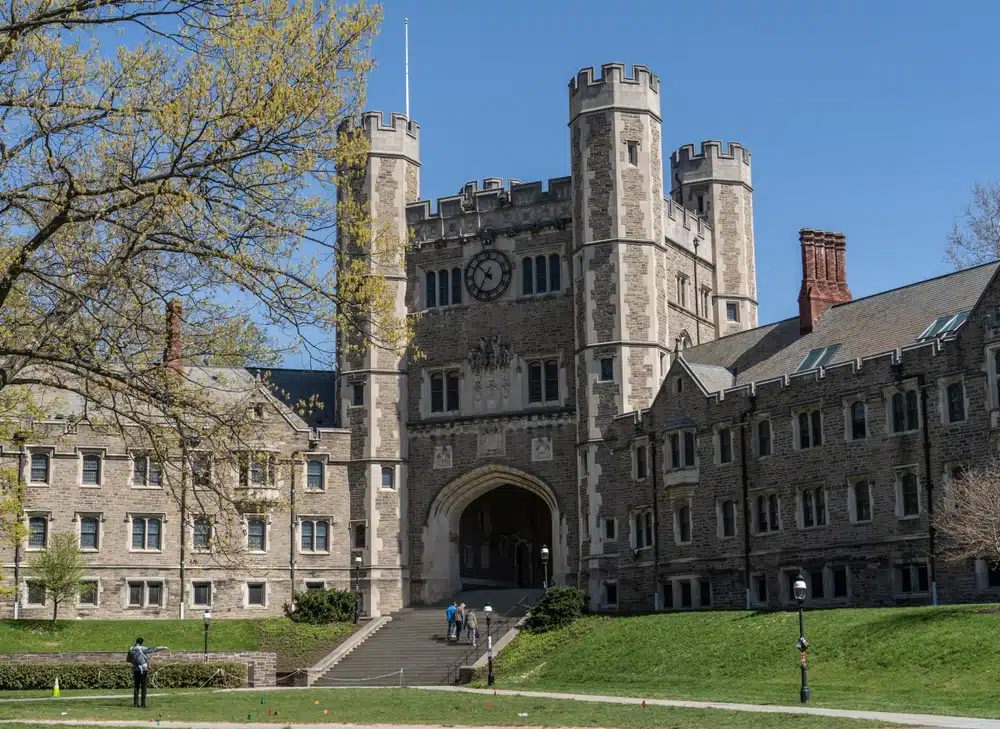What Major is Princeton Known For?
What is Princeton University?
Princeton University, located in the picturesque town of Princeton, New Jersey, is consistently ranked among the top academic institutions in the United States and globally. With a rich history dating back to its founding in 1746, Princeton has long been synonymous with academic excellence and a commitment to intellectual pursuits, attracting some of the brightest minds worldwide. But then people would like to know, “What major is Princeton known for?”
Given the competitive nature of higher education and the significant role one’s choice of major plays in shaping career prospects and personal growth, selecting the right major at such a prestigious institution becomes crucial for any student.
This outline examines the academic disciplines that have earned Princeton its stellar reputation, shedding light on the areas of study the university is best known for and providing valuable insight to prospective students and those interested in its academic strengths.
History and reputation
Since its founding in 1746 as the College of New Jersey, Princeton University has evolved into a powerhouse in global academia, continually expanding its academic programs and research capabilities to reflect the changing needs of society.
The prestigious institution boasts a long list of notable alumni who have significantly contributed to various fields, including politics, economics, literature, and the sciences. These distinguished graduates include former U.S. Presidents Woodrow Wilson and James Madison, Nobel laureates such as John Nash in Economics and Albert Einstein in Physics, and acclaimed authors like F. Scott Fitzgerald and Toni Morrison.
Princeton’s impact on global academia and research are undeniable, as it has consistently produced groundbreaking discoveries, fostered innovative thinking, and cultivated leaders who have shaped the world in many ways. As a result, the university’s reputation has only grown stronger over time, solidifying its position as one of the world’s preeminent centers for higher learning and research.
Why study at Princeton?
Studying at Princeton University offers many benefits for students seeking world-class education, unparalleled research opportunities, and vibrant campus life. Here are some reasons why studying at Princeton can be a transformative experience:
Academic excellence: Those trying to learn what major is Princeton known for can find that Princeton is consistently ranked among the top universities in the world. They are known for their rigorous academic programs, exceptional faculty, and commitment to intellectual pursuits across various disciplines.
Prestigious faculty: Princeton includes numerous Nobel laureates, Pulitzer Prize winners, and other renowned experts. Students have the unique opportunity to learn from these accomplished scholars and engage in thought-provoking discussions with them.
Research opportunities: Princeton provides extensive resources and support for undergraduate and graduate students to conduct groundbreaking research, enabling them to contribute to their fields and gain valuable hands-on experience.
Small class sizes: Princeton’s commitment to maintaining a low student-to-faculty ratio ensures that students receive personalized attention and can actively participate in class discussions, fostering a more meaningful learning experience.
Financial aid: Princeton offers generous financial aid packages to students, ensuring that financial constraints do not hinder deserving candidates from accessing the university’s exceptional education.
Vibrant campus life: Princeton’s beautiful, historic campus is home to a diverse and inclusive community where students can participate in various extracurricular activities, clubs, and organizations that cater to various interests.
Strong alumni network: Princeton’s extensive alumni network spans the globe, offering students invaluable networking opportunities, mentorship, and connections that can help advance their careers and personal growth.
Excellent career prospects: Graduates from Princeton are highly sought after by top employers across various industries, ensuring a strong foundation for a successful career.
Interdisciplinary approach: Princeton encourages interdisciplinary learning, allowing students to explore diverse fields and broaden their perspectives, fostering critical thinking and problem-solving skills.
Commitment to service: Princeton emphasizes the importance of civic engagement and service, empowering students to positively impact their communities and the world at large.
Overall, studying at Princeton offers a well-rounded education that nurtures intellectual growth, fosters personal development, and equips students with the skills and knowledge to excel in their chosen fields and make a difference in the world.
Top majors at Princeton
Public Policy (Woodrow Wilson School)
The Public Policy major at Princeton, offered through the esteemed Woodrow Wilson School, has a long-standing tradition of producing exceptional graduates who have made their mark in public policy and government and is one of the top majors at Princeton.
Notable alumni from this program include influential figures such as former U.S. Secretaries of State James Baker and George Shultz, U.S. Senator Ted Cruz, and Supreme Court Justice Samuel Alito, among many others.
Princeton’s Public Policy graduates’ impact on domestic and international policy is profound, as they have played key roles in shaping legislation, implementing policies, and advocating for social and political change.
Furthermore, those trying to learn what major is Princeton known for will find that the university’s Economics program is renowned for its world-class faculty and innovative research. Because of this, the university has significantly contributed to developing economic theory and policy.
Princeton’s Economics Department is home to several Nobel laureates, including Paul Krugman and Angus Deaton, whose work has influenced macroeconomic policies, international trade, and our understanding of global poverty and inequality.
This strong tradition of academic excellence in both public policy and economics underscores Princeton’s commitment to fostering intellectual growth and nurturing leaders who will shape the world’s future.
Economics
Princeton University’s Economics Department has long been recognized for its exceptional faculty and groundbreaking research, particularly as it pertains to its Nobel Prize-winning members and the significant influence, they have had on economic policy worldwide.
Esteemed laureates such as Paul Krugman, Angus Deaton, and Sir W. Arthur Lewis have graced the halls of Princeton, contributing to the university’s reputation as a premier institution for studying economics. These distinguished scholars have profoundly impacted various facets of economic policy, ranging from international trade and finance to the study of poverty and income inequality.
Their work has shaped the way policymakers and economists think about crucial issues, providing insights that have guided decisions on a global scale. The expertise and accomplishments of Princeton’s Economics faculty serve as a testament to their commitment to academic excellence and highlight the crucial role that economic research plays in addressing some of the most pressing challenges facing societies today.
Computer Science
Princeton University’s Computer Science program has distinguished itself through cutting-edge research and advancements in artificial intelligence (AI) and machine learning, solidifying its position as a leading institution in the ever-evolving world of technology. This has made it one of the programs of choice for some people learning about what major is Princeton known for.
Faculty and students at Princeton have been at the forefront of developing innovative algorithms, models, and applications that have contributed to the rapid growth and adoption of AI and machine learning across various industries. This pioneering work has not only furthered our understanding of these complex technologies but has also facilitated the development of practical solutions to real-world problems.
Additionally, Princeton’s strong connections with Silicon Valley have fostered valuable partnerships and collaborations with major technology companies, providing students and researchers with unique opportunities to engage with industry leaders, gain hands-on experience, and contribute to shaping the future of technology.
The university’s commitment to pushing the boundaries of computer science research and nurturing the next generation of technology innovators is a testament to its dedication to both academic excellence and the advancement of society.
Physics
Princeton University’s Physics Department has earned a stellar reputation for its close association with the Institute for Advanced Study. This independent research center has been the intellectual home to numerous trailblazing scientists, including Albert Einstein.
This collaboration has resulted in significant contributions to particle physics and astrophysics, with researchers exploring the fundamental forces and particles that make up the universe and the celestial phenomena that govern its behavior.
Princeton physicists have been instrumental in uncovering new particles, formulating groundbreaking theories, and advancing our understanding of the cosmos, often utilizing the university’s state-of-the-art facilities and resources to achieve these breakthroughs.
These pioneering discoveries have enriched the scientific community and captivated the wider public’s imagination, inspiring generations of physicists to continue the quest for knowledge.
Princeton’s unwavering commitment to scientific inquiry and its strong tradition of excellence in physics demonstrates the university’s dedication to fostering an environment that encourages intellectual curiosity and the pursuit of new frontiers in research.
Mathematics
Princeton University’s Mathematics Department is renowned for its prestigious faculty and alumni who have made lasting contributions to modern mathematics. Esteemed mathematicians such as John Nash, Alan Turing, and Andrew Wiles have been associated with Princeton, contributing to the university’s reputation as a premier institution for mathematical research and education.
Their groundbreaking work in game theory, cryptography, and number theory has advanced our understanding of mathematical concepts and had far-reaching implications for various other disciplines, including economics, computer science, and theoretical physics.
Princeton’s mathematicians have played a pivotal role in shaping the course of mathematical research. They have been recognized with numerous awards, including Fields Medals and Abel Prizes, for their outstanding achievements.
The university’s commitment to fostering a vibrant intellectual community that nurtures the development of future generations of mathematicians is a testament to its dedication to both academic excellence and the advancement of human knowledge in this fundamental field of study.
Literature and Creative Writing
People learning what major is Princeton known for would find the literature and creative writing programs among the top choices. Princeton University’s literature and creative writing programs are celebrated for their exceptional faculty and alumni authors. They have significantly contributed to the literary world and earned prestigious accolades such as Pulitzer Prizes, National Book Awards, and MacArthur “Genius” Grants.
Esteemed writers like Toni Morrison, Jhumpa Lahiri, and Jeffrey Eugenides have been associated with Princeton, serving as mentors and instructors for aspiring authors and enriching the university’s literary community.
To foster the development of creative talents, Princeton offers a wide array of writing seminars and workshops that allow students to hone their craft, engage in meaningful discussions about literature, and receive invaluable feedback from their peers and accomplished writers.
These immersive experiences help students refine their writing skills and encourage them to explore various literary genres, styles, and techniques, broadening their understanding of the written word and cultivating their unique voices as authors. Princeton’s commitment to nurturing literary talent and fostering a vibrant community of writers reflects the university’s dedication to the arts and its essential role in shaping human expression and understanding.
History
One of the results when a person researches what major is Princeton known for is its history program. Princeton University’s History Department is renowned for its influential historians and researchers who have substantially contributed to historical scholarship across diverse periods and regions.
Esteemed scholars such as Bernard Bailyn, Nell Irvin Painter, and Anthony Grafton have been associated with Princeton. Their pioneering work has expanded our understanding of various historical events and processes, from the origins of the American Revolution to the intricacies of Renaissance intellectual life.
The groundbreaking research conducted by Princeton’s historians has not only deepened our comprehension of the past. Still, it has also influenced the broader field of historical inquiry by introducing innovative methodologies, interdisciplinary approaches, and fresh perspectives on well-established narratives.
Through their rigorous scholarship, these historians have shaped the way we study history, pushing the boundaries of the discipline and encouraging critical engagement with the past.
Princeton’s commitment to fostering a vibrant intellectual community of historians and supporting cutting-edge research in the field reflects the university’s dedication to understanding the complex tapestry of human history and its ongoing relevance in shaping our present and future.
Now that you have a vision of Princeton University, you should also begin preparing for your college admission. You can get help with AdmissionSight with the help of our world-class guidance. You can enter the best university that suits you best with the guidance of AdmissionSight. You can talk to our experts today to get started.









































